ECONOMIC RIGHTS
Davao farmers transforms community through a certification in organic farming
By Elijah Macaspac
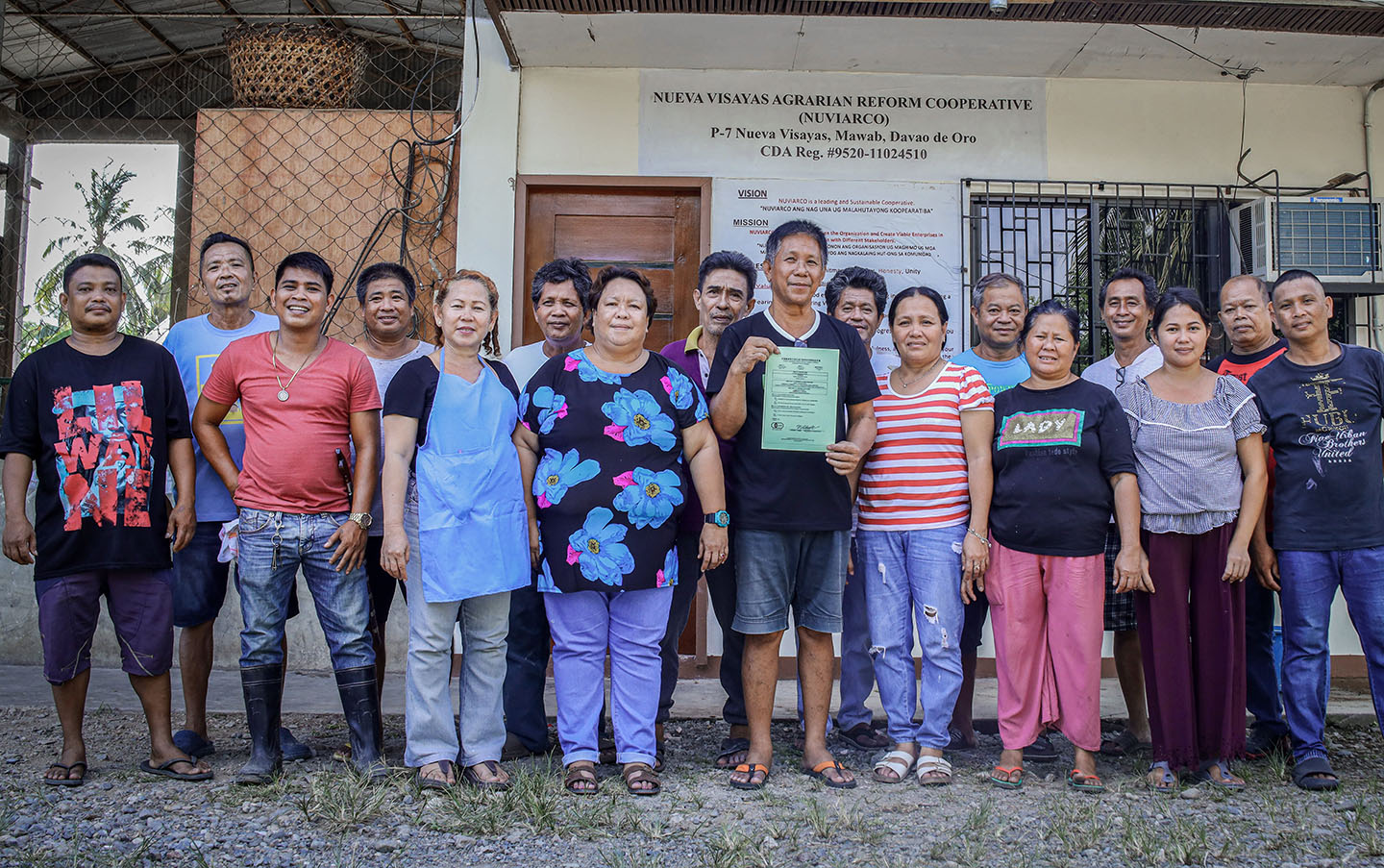
NUVIARCO farmers earn a Japanese Agricultural Standards (JAS) certification for their cardava bananas.
Banana farmers in Mawab, Davao de Oro used to earn as little as three pesos (Php 3.00) per kilo for their crops. In order to make ends meet, some farmers were compelled to mortgage their land for dismal sums of money. Due to low farmgate prices and lack of access to financial support and training, they struggled to acquire the necessary resources and knowledge to expand their farms.
Wanting more for their community, farmers pursued organic farming for a more sustainable and environmentally-friendly livelihood. What started as small seeds planted grew into success accessible to their loved ones and the community they are a part of.
Now, they are one of the top exporters of certified organic cardava bananas to the Japanese market.
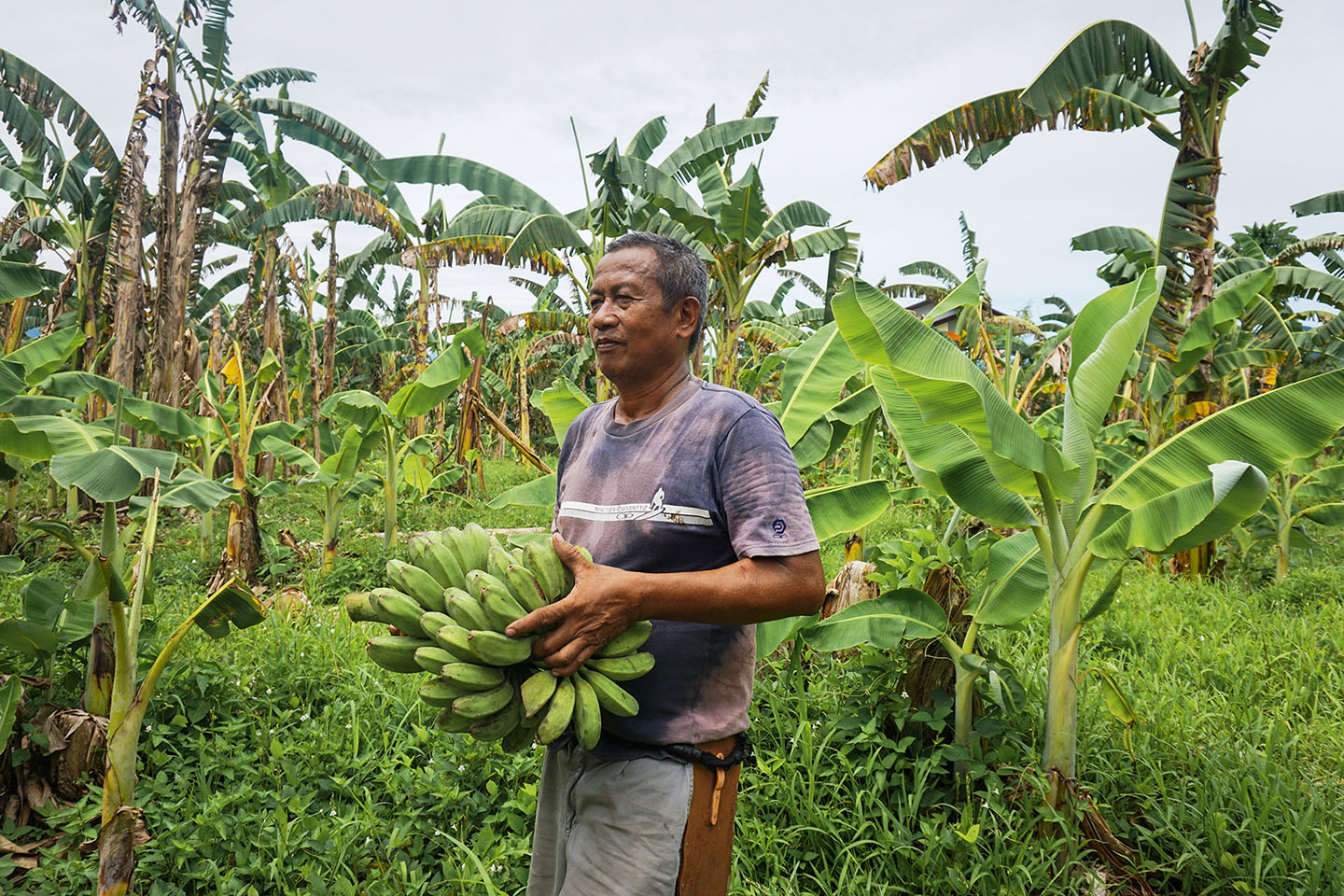
Norberto Esperil, an elderly farmer and NUVIARCO member, harvesting crops for export to the Japanese market.
“Pinakaimportante para sa isang magsasaka na alam kung paano niya malalampasan ang kahirapan,” Norberto Esperil, 58 year old farmer, said. (It’s important for a farmer to know how to overcome poverty).
Organic farming provides a sustainable livelihood for elderly farmers. It safeguards them from harmful chemicals used in traditional farming, and it enables them to sell their crops at a much higher price due to the growing organic export market.
The Guidance for Agrarian Reform Beneficiaries on Organic Farm Development and Sustainable Ways of Working (GROW) project started in January 2022 to strengthen the capacities of 146 agrarian reform beneficiaries (ARBs), to run a cooperative enterprise and facilitate their transition to organic farming methods. Majority of them are elderly members of the Nueva Visayas Agrarian Reform Cooperative (NUVIARCO) who used to practice conventional farming methods and utilize harsh pesticides that were harmful to their lands and health.
Project GROW is supported by Voice and implemented by the Initiatives for Dialogue and Empowerment through Alternative Legal Services (IDEALS), in partnership with The Foundation for Agrarian Reform Cooperatives in Mindanao (FARMCOOP).
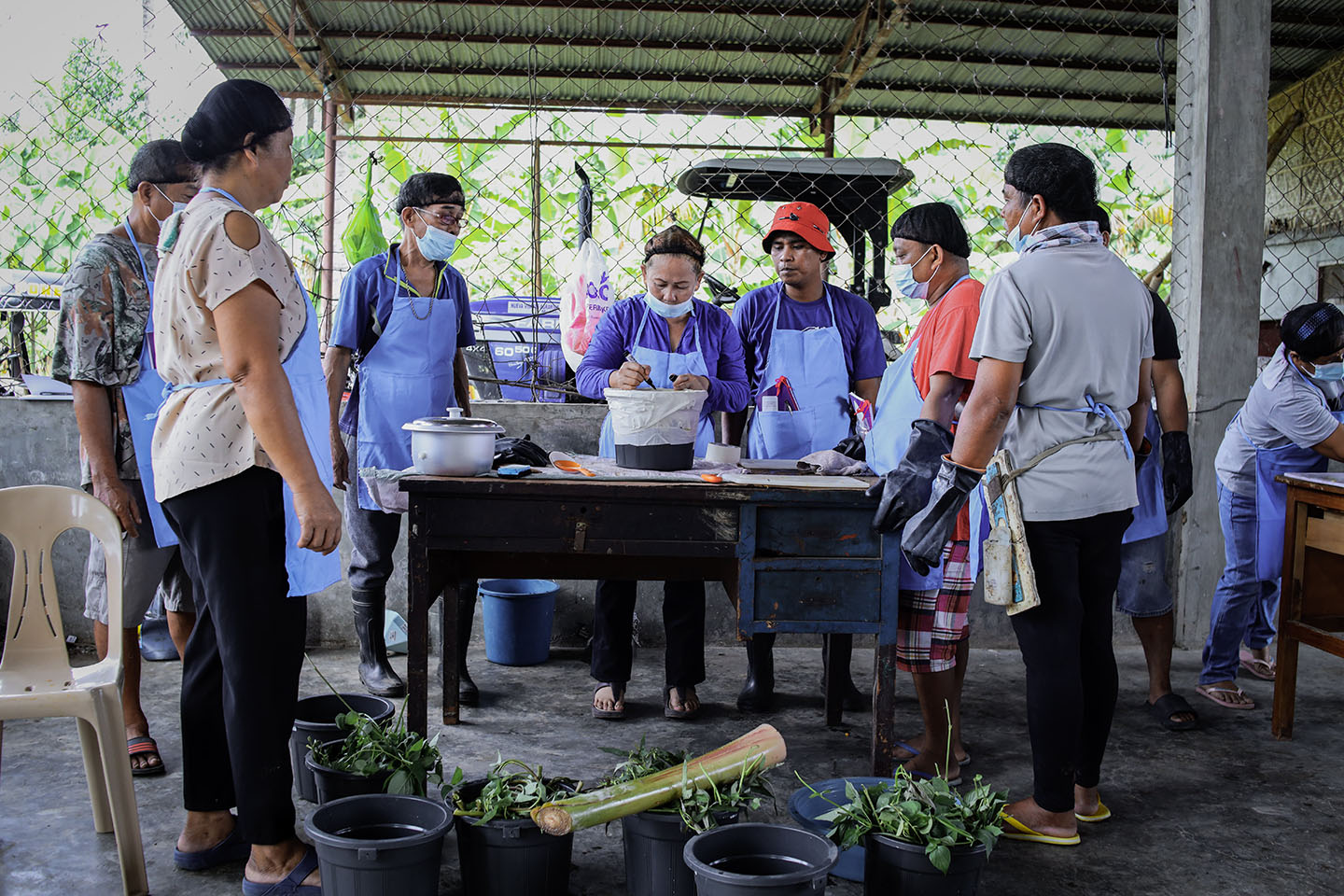
Second batch of NUVIARCO farmers participating in an organic input production training last May.
Organic farming requires a lot of patience since it takes at least three years to transition from chemical-based farming to an organic one, but it is all worth it.
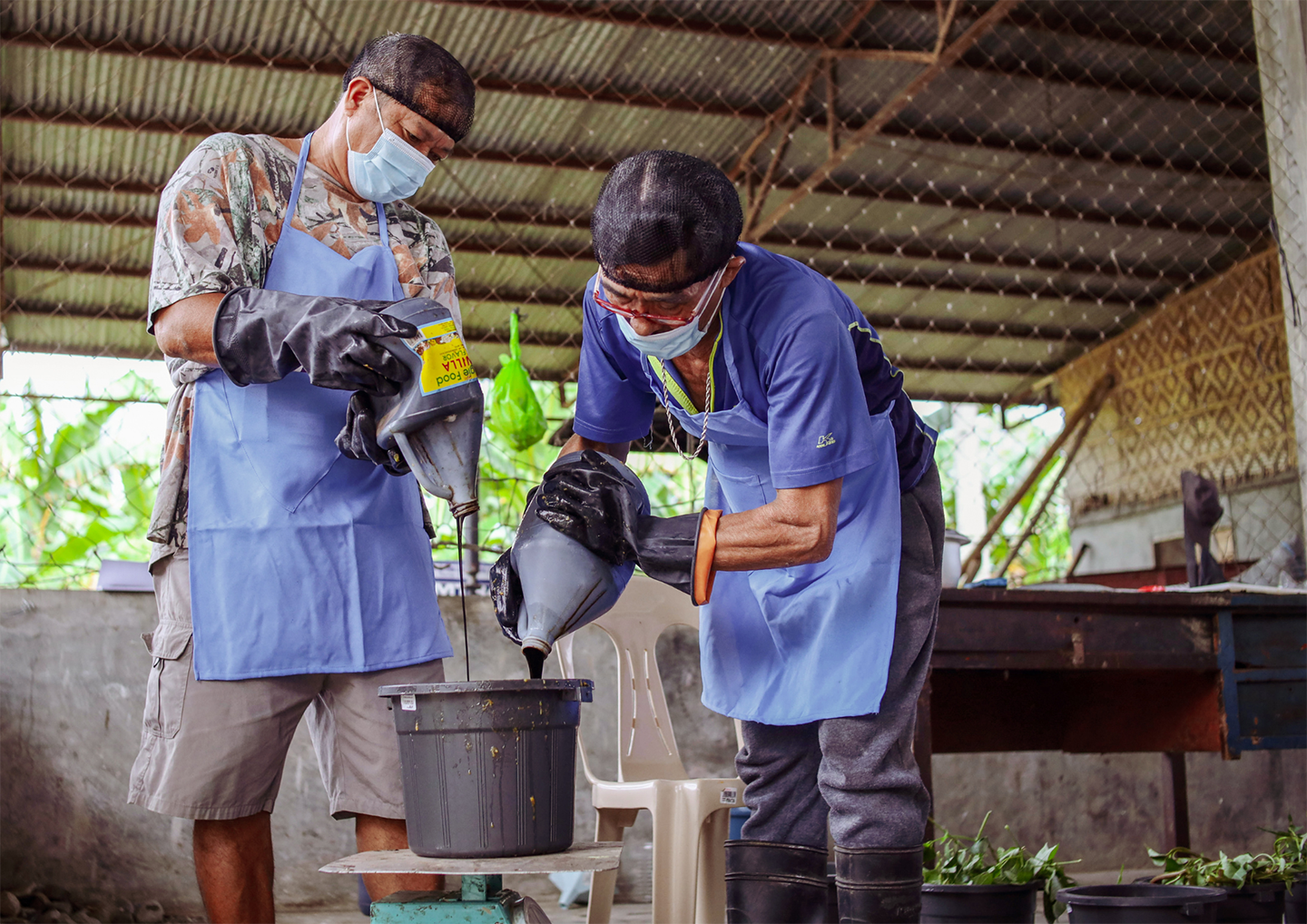
Farmers making their organic compost to use on their farms.
Chemical-free inputs have boosted their farm productivity, profitability,and repaired decades of environmental harm, Esperil said. It also made farming safer for the farm workers, their families, and their communities.
“Makikita namin ang aming mga anak, free na sila maglaro-laro at hindi na kami matatakot na baka pumunta sila sa mga may contamination,” he added. (Our children can now play freely on our farms. There’s no more fear that they might go to contaminated areas).
Farmers also learned about cooperative and financial management, enabling them to harness sustainable future and long-term success for their cooperative.
“Nakasali na ako sa maraming trainings. Marami akong certificate, aabot ito ng mga sampung certificate,” he stated. (I participated in many training sessions. I think I have around ten certificates)..
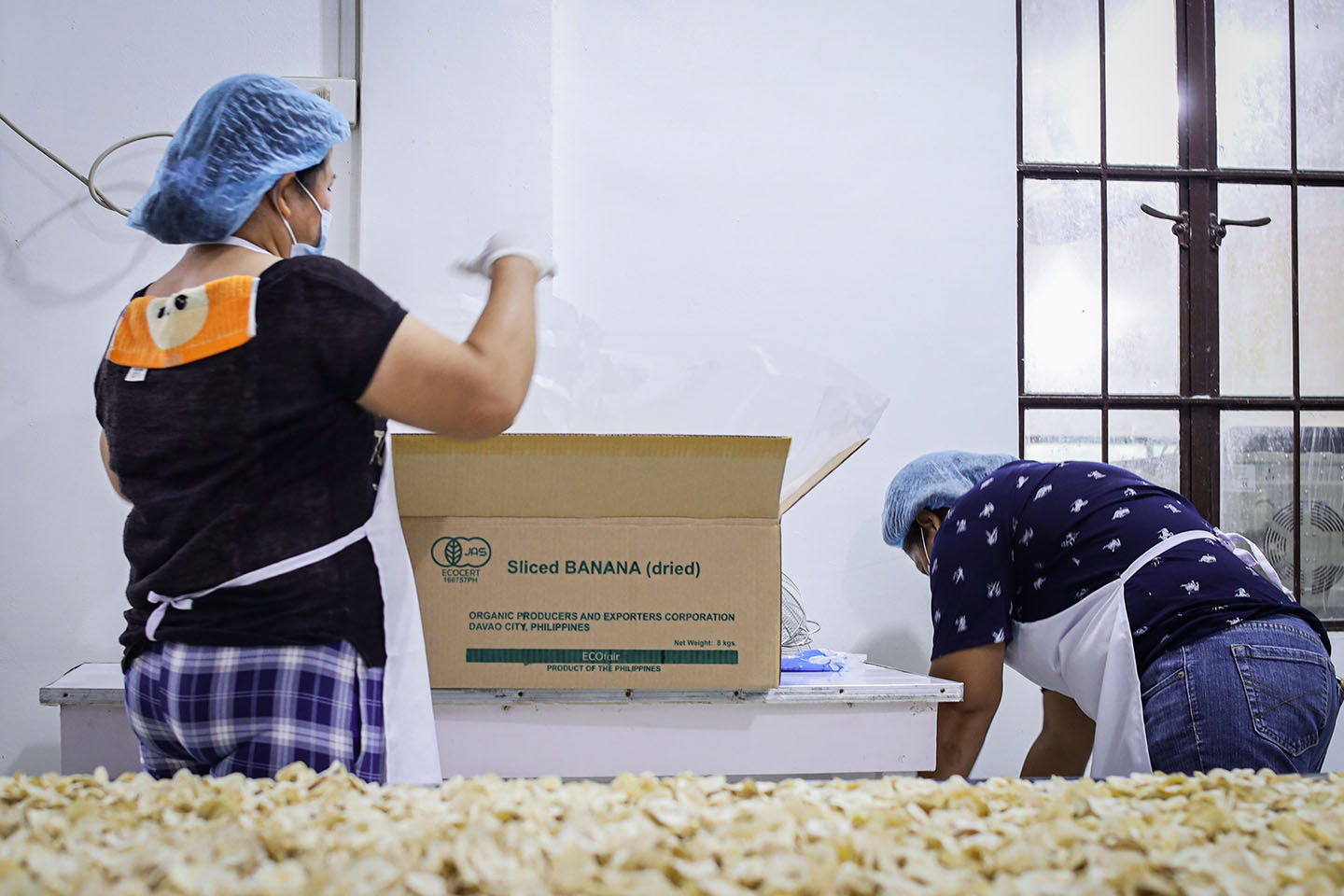
OPEC staff processing the cardava bananas from NUVIARCO for export
Through Project GROW, a total of 39.76 hectares of land of 35 NUVIARCO farmers earned their Japanese Agricultural Standards (JAS) certification in May 2023. JAS is a Japanese national standard for organic products established by the Minister of Agriculture, Forestry and Fisheries. Sixty-one other NUVIARCO farmers await their results after undergoing inspection.
FARMCOOP assisted NUVIARCO in applying for a JAS certification through Ecocert, a certifying body accredited by the Japanese government to check compliance to the official regulations.
“Sa Japan, kaunti ang nag-eexport dahil sa strict regulations nila. Hindi pa nata-tap ang malaking market sa Japan para sa mga crops na ito,” Jeffrey Mandalunes, FARMCOOP staff, said. (Only a few export to Japan because of their strict regulations. However, there is a big market there that we can tap for these crops).
With the JAS organic seal, NUVIARCO can assure their buyers that their crops are planted in accordance with the highest Japanese certification standards. Further, this gives them access to greater stakeholder communications which can help them secure more investors and buyers.
The certification journey was challenging but rewarding. They went through a rigorous process since they had to provide legal proof of their land ownership and set up an internal control system (ICS) to ensure that their operations adhered to the official Japanese standards.
Fortunately, through FARMCOOP and its trading arm, Organic Producers and Exporters Corporation (OPEC), NUVIARCO already had a main trading partner which connected them to an existing Japanese market that sells banana chips and banana resistant starch. This sped up their application process for certification.
Their inspection started in December 2022. In the following months, they focused on addressing the concerns and non-compliance notices they received. Finally in May 2023, Ecocert officially granted them their JAS organic certification.
Mandalunes recalled how their Japanese buyer was impressed and pleased with the large volumes of organic cardava bananas coming from the Philippines.
“For a very long time, ang price nila (NUVIARCO) is 5-6 pesos per kilo. Dahil nagkamarket ng dried process cardava, nadouble na ang price ng NUVIARCO at may mayroon nang sustainable market na malakihang volume pa ang binibili sa kanila,” Mandalunes said. (For a very long time, they sold their crops for as low as 5-6 pesos per kilo. With the Japanese market for dried and processed cardava bananas, the price of NUVIARCO’s crops has doubled and they now have a sustainable market who buys large volumes from them).
The certification is a big step forward towards NUVIARCO’s goals. Esperil recalled how the cooperative celebrated when they got the news. They take pride that they started organic farming in their community.
“May mga pumunta dito sa office nung nalaman nilang nakapasa kami. Maraming nagpalista ng kanilang pangalan kasi gustong sumali sa organic training, kahit mga hindi member ng koop. ‘Yung community gusto na sumali,” Esperil said. (A lot of people came to our office when they found out we passed the certification. Many registered their names to join our training, even those who are not members of our cooperative. We’re happy that our community wants to take part).
Looking to the future
From September 2022 to February 2023, NUVIARCO exported 69,000 kilos of their low-chemical bananas to Japan. They regularly export to diversify their market opportunities, facilitate domestic economic activity and foster industrial growth.
Furthermore, NUVIARCO continuously works together to improve their lives and their economic situation. Recently, its management started micro-lending for its members. Any NUVIARCO member with good financial standing can apply for a loan of ₱5,000 and ₱10,000 with 5% interest. They use a diminishing balance payment method wherein the interest payment decreases as the unpaid balance decreases.
This lending business adds income for the cooperative while empowering its members to access more inputs needed to increase their crop production and profit without the trouble of fulfilling several required documents by banks.
“Nagpapasalamat kami na nakagawa kami ng ganitong pagbabago sa aming buhay, sa tulong ng IDEALS at Voice,” Esperil said. (We are grateful that we were able to make this kind of change in our lives, through the help of IDEALS and Voice).
From the start, Project GROW intended to serve as a model for the future of large-scale organic cardava banana production in the Philippines. Members of NUVIARCO commit their land for the cooperative’s business operations. They continue to remain the landowners, but they also participate in the cooperative by providing labor from which they benefit financially. Beyond meeting their basic needs, elderly farmers are working to lift themselves out of poverty and create a healthier community.
.
